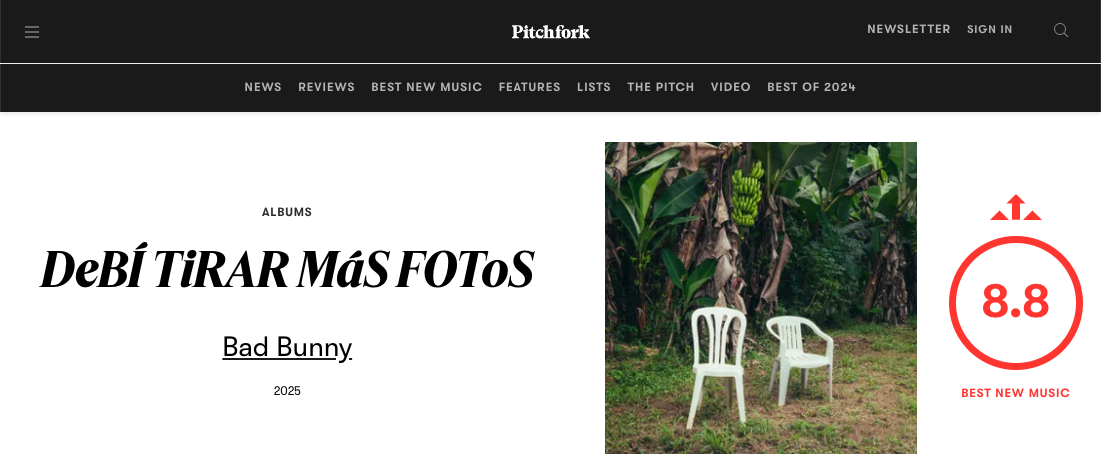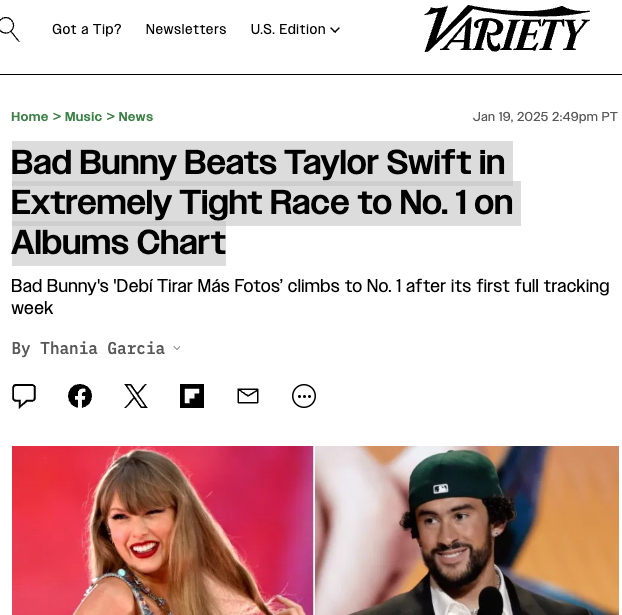Just in case
« previous post | next post »
Variety told us a few days ago that Bad Bunny's new album made it to first place on the Billboard 200 — "Bad Bunny Beats Taylor Swift in Extremely Tight Race to No. 1 on Albums Chart". In other coverage, Pitchfork's review leads with the assertion that "Bad Bunny synthesizes the past and present sound of Puerto Rico for an anthemic, cross-generational album", and connects the music to the island's social and political history.
My focus this morning is on the album's non-standard capitalization ("DeBÍ TiRAR MáS FOToS" = " I should have taken more photos"). We can start with a difference in editorial choices: Pitchfork follows the album's use of upper and lower case letters in its title, while Variety standardizes the spelling (“Debí Tirar Más Fotos”). The English translation in either case is of course the same, "I should have taken more photos".
Across the current mass media coverage, Variety's editorial standardization seems to be the most common, but there are some outlets besides Pitchfork that respect the album's orthographic choices.
The album's non-standard capitalization choices continue through the tracklist:
NUEVAYoL
VOY A LLeVARTE PA PR
BAILE INoLVIDABLE
PERFuMITO NUEVO
WELTiTA
VeLDÁ
EL CLúB
KETU TeCRÉ
BOKeTE
KLOuFRENS
TURiSTA
CAFé CON RON
PIToRRO DE COCO
LO QUE LE PASÓ A HAWAii
EoO
DtMF
LA MuDANZA
The title "DeBÍ TiRAR MáS FOToS" has ten upper-case consonants, four lower-case vowels, and three upper-case vowels, and the initialized title track "DtMF" has three upper-case consonants and one lower-case consonant. All the other track names employ all upper-case letters, except for exactly one lower-case vowel in each of them.
There are a few discussions elsewhere but it's striking that TikTok offers so MANY explanations for "What Do The Lower Case Letters In Bad Bunny's new Album Mean" — which probably tells us something about TikTok's current cultural role, though maybe also its search algorithm (since many most of the results don't try to answer the question…).
In this 1/14/2025 interview, Bad Bunny is asked "Por qué se titularon así las canciones con así mayúscula minúscula?" ("Why were the songs titled that way with majuscule and minuscule letters?"):
I'll leave it to readers to evaluate his answer, and to compare the various tiktok explanations.
For now, I'll just note the loss of syllable-final /s/ in the question's pronunciation of "mayúscula minúscula":
[For some linguistic background (totally unrelated to capitalization and only marginally related to pop music), see the section on "Spanish /s/ Lenition" in this paper.]


Laura Morland said,
January 22, 2025 @ 10:10 am
My Spanish is minimal, but I believe that Bad Bunny said that he was searching for a creative way to make his song titles sTaNd OuT.
He succeeded!
J.W. Brewer said,
January 22, 2025 @ 10:40 am
I'm looking right now at what purports to be a scan of the album's back cover, and the variation of case in the song titles is quite minimal. Most seem to be ALLCAPS with a single lower-cased intrusion. E.g. "BAILE INoLVIDABLE" and "PERFuMITO NUEVO." The lower-cased ones in the song titles are almost always vowels except for DtMF, which is perhaps an initialism and lacks an obvious vowel.
"Not as cool as the distinctive fonts Led Zeppelin sometimes used to use!" said one aging LL commenter while yelling at a cloud in the sky.
Mark Liberman said,
January 22, 2025 @ 10:52 am
@J.W. Brewer: " [T]he variation of case in the song titles is quite minimal. Most seem to be ALLCAPS with a single lower-cased intrusion.":
As the OP put it, "the initialized title track "DtMF" has three upper-case consonants and one lower-case consonant. All the other track names employ all upper-case letters, except for exactly one lower-case vowel in each of them."
So, yes…
Gregory Kusnick said,
January 22, 2025 @ 11:30 am
Back in my online gaming days (late 90s to mid-aughts) it was considered cool (for reasons that still escape me) to choose screen names with wEiRd CaPiTaLiZaTiOn. Bad Bunny, born in 1994, would have grown up during this era, if that's of any relevance.
Mark Liberman said,
January 22, 2025 @ 12:53 pm
@Gregory Kusnick:
Version 4.4.7 of the Jargon File has an entry for "studlycaps":
A hackish form of silliness similar to BiCapitalization for trademarks, but applied randomly and to arbitrary text rather than to trademarks. ThE oRigiN and SigNificaNce of thIs pRacTicE iS oBscuRe.
JimG said,
January 22, 2025 @ 1:55 pm
Weird, from a cursory look, without having heard anything.
1 lowercase vowel (only vowels) per title.
Exceptions: Album title and final i of Hawaii
Lowercase in the main/longest element of the title.
Exception: NUEVAYoL (? PR translation/pronunciation of New York?)
DJL said,
January 22, 2025 @ 5:17 pm
Odd to see 'club' with a diacritic, I don't think I have ever seen that in Spanish before. (The diacritics in veldá, for 'verdad', and in tecré, for 'te crees', are more common when dropping a word's last sound).
J.W. Brewer said,
January 22, 2025 @ 7:18 pm
As Prof. Liberman points out, my original research inspired by the original post was kind of pointless since I would have learned the same thing had I scrolled down further and read the entirety of the original post. All I can say, not by way of exculpation, is that apparently the original post's mixture of text followed by screenshots followed by more text (and then more screenshots) fooled my insufficiently-attentive eye into thinking I'd reached the end of the post before it had, in fact, ended.
This is why, in certain contexts but not all, the https://en.wikipedia.org/wiki/-30- convention arose. If there is an agreed explicit convention for indicating the end of something, not having yet seen the agreed indication is a strong signal to keep scrolling down. Absent such a convention, we need to pay better attention and not be fooled by formatting vagaries. (In the old days when I worked in radio, you needed to avoid being fooled by certain records that had a "false ending" with a moment of silence before the song resumed, lest you be "burned" by starting to talk on mike on the false assumption the song was over. Public-spirited fellow DJ's would sometimes annotate the cardboard jackets containing such records in marker or ballpoint, warning that the silence such-and-such minutes-and-seconds in was a ruse you shouldn't fall for.)
Philip Taylor said,
January 23, 2025 @ 7:09 am
From my days with the GPO ("General Post Office", but to its employees "God's Poor Orphans"), I seem to recall that telexes were introduced by ZCZC and ended with NNNN
Chris Button said,
January 23, 2025 @ 9:35 pm
In "DeBÍ TiRAR MáS FOToS", it essentially aligns with stress placement, albeit with a capital letter at the start of each word and single-syllable MáS just being weird.
That theory dies not seem to hold across the song titles though.
Peter Erwin said,
January 24, 2025 @ 2:24 pm
For now, I'll just note the loss of syllable-final /s/ in the question's pronunciation of "mayúscula minúscula"
Something very similar happens in the Spanish of the Canary Islands, though my memory is that it mostly happens a) at the end of a word; or b) before another consonant (as is the case in both of your examples).
This made it fun trying to tell the difference between the island of La Palma and the city of Las Palmas (on the island of Gran Canaria).
Nat J said,
January 26, 2025 @ 11:33 pm
It seems to be that there are two distinct ways to interpret these capitalization schemes:
1) They could be intended as an essential part of the name of each track and the album, in which case the press is obligated to respect the capitalization when discussing the tracks in order to "correctly" use the name.
2) The erratic capitalization is a decorative choice that is just a part of the aesthetics of the album cover. In this case, they aren't an essential part of the names, and the music press can and should use their standard policies on capitalization.
I'm sure there's a more precise and technical way of characterizing this distinction. I'm curious what that would be. Or maybe this isn't a real distinction at all.